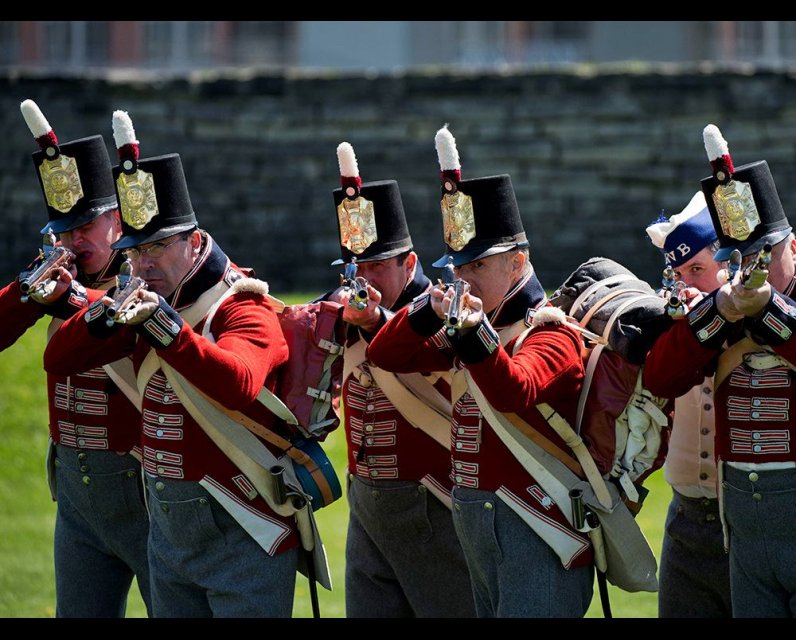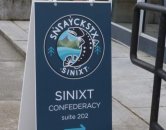The redcoats are coming — but this time the Americans invited them

America’s most prestigious lawyers’ group is gathering in Toronto Monday, ironically to be greeted by an honour guard of redcoats from the War of 1812 in which American troops sacked the city.
As Canada and the United States are embroiled in a trade war, more than 1,700 people are expected to attend the American Bar Association’s meeting at the Metro Toronto Convention Centre. On the agenda is tackling U.S. President Donald Trump’s law firm intimidation tactics. But first, their house of delegates will be greeted by two members of the Fort York Guard, student re-enactors wearing the historic red uniforms of America’s former enemy.
The fun part: the association’s house of delegates specifically asked to be greeted by the former-enemy redcoats.
“The American Bar Association, like so many professional associations in the United States, leans left. So, they’re going to come up with a plan there that maybe makes a statement to maybe twist Trump’s nose, as it were, the way the Americans used to twist the British alliance’s tail. So, that doesn’t surprise me at all that they would find a way of making a statement to show that they do not approve of his trade war,” said Donald Hickey, a retired Wayne State College history professor The New Yorker dubbed “the dean of 1812 scholarship.”
He suspects the two countries will eventually resolve their differences. “I’m sure they’ll work it out. This is just a little blip, I think, in Canadian-American relations. Although Trump didn’t help at all when he said Canada ought to be a 51st state. That was, I think, ill-advised,” Hickey said in an interview from Omaha, Nebraska.
Don Cranston heads the Friends of Fort York, an organization that promotes the protection of the Fort York National Historic Site, a 43-acre archeological park, where the bloody Battle of York took place more than two centuries ago. He was thrilled the American Bar Association asked for the pretend redcoats to form an honour guard at its meeting.
“Their membership is very appreciative of the past relationship with Canada, and I think they are, in a way, trying to say, ‘Hey, we’ve never had a closer friend. Why are we alienating our closest friend?’” said Cranston, a senior investment counsellor with Fiera Capital.
He points out that, in retaliation for burning and looting Fort York in 1813, British forces marched on Washington, D.C., the following year and burned down the White House and other public buildings.
Cranston hopes playing nice with the visiting American lawyers will help convince them our two countries are better off standing together than not. “But, in my mind, the guard also signifies that if we have to fight, we will.”
While he’s aware of the role soldiers from Fort York played in the War of 1812, Jonathan Cole, who heads the American Bar Association’s house of delegates, downplayed any suggestion that inviting redcoats to Monday’s session is meant as a commentary on Trump’s trade war or his musings about annexing Canada.
He noted the ABA’s Toronto session has been years in the planning, pre-dating the recent friction between two countries that share the world’s longest international land border.
“It’s a good chance to work together despite political issues,” Cole said in an interview from Nashville, Tennessee.
Fort York’s history is a reminder of how “the two countries have worked together since and have been such great allies,” Cole said.
He’s excited the honour guard from Fort York is participating. “They’ll present both the American flag and the Canadian flag, and we’ll have the national anthems sung for both countries as well before we begin our proceedings.”
American forces captured Fort York in the spring of 1813.
“They essentially conquered Fort York and they burned some of the buildings,” Hickey said.
“It was an unpleasant business for people in and around York at the time.”
Hickey argues the War of 1812 was “essentially Canada’s war of independence — and they won, so it is far better remembered in Canada than in the United States.”
There are several ways to see the conflict, he said.
“If you look at what happened on the battlefield and in the peace treaty (of Ghent) it looks like a draw because it was very hard to wage offensive warfare in the North American wilderness and when the United States was on the offensive early in the war they failed to make much headway in Canada,” Hickey said.
“And when the British were in the driver’s seat in the last year of the war, they didn’t make much headway either.”
But overall “it’s a clear British and Canadian victory because the United States went to war to force the British to give up the orders in council, which restricted American trade with the continent of Europe, and also to end impressment — the removal of seamen from American merchant vessels,” Hickey said. “And neither of those issues was mentioned in the peace treaty” signed in December of 1814.
The only way to argue the U.S. benefitted from the conflict is, “the British had a real problem after the war was over; nobody knew that was going to be the last Anglo-American war. And how were they going to defend Canada next time around from this growing expansionist colossus to the south?” Hickey said. “They decided that their best tack was to accommodate the United States. And they pursued that policy in the course of the 19th Century, and ultimately it worked. There was a genuine Anglo-American accord by the 1890s. Then it turned into co-belligerency in World War One, and full-fledged alliance in World War Two that continues to this day. So, in the end, the United States got a little more respect for its sovereignty from the British.”
Our website is the place for the latest breaking news, exclusive scoops, longreads and provocative commentary. Please bookmark nationalpost.com and sign up for our daily newsletter, Posted, here.



Comments
Be the first to comment